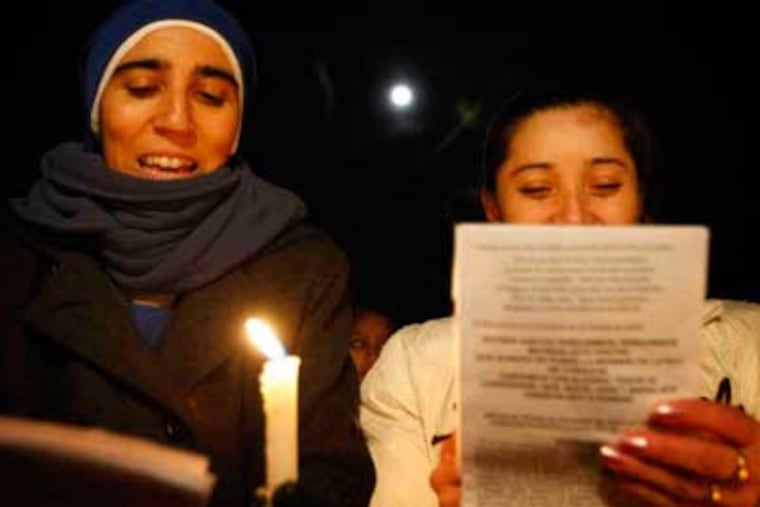Christmas tradition goes door-to-door in Avondale
On a cold, clear night in Avondale Borough, Chester County, Lilia Gonzalez and four dozen other Hispanic Catholics wandered among the houses and trailer homes to ask for shelter.

On a cold, clear night in Avondale Borough, Chester County, Lilia Gonzalez and four dozen other Hispanic Catholics wandered among the houses and trailer homes to ask for shelter.
They sang the words in Spanish, their path lit by the full moon and the candles they cupped against the wind. They followed two teenagers dressed in robes to portray the Virgin Mary and Joseph, reenacting the search for room at an inn on the eve of Jesus' birth.
The tradition, a nine-day novena called the Posadas, held special meaning this year for Gonzalez. Like Mary, Gonzales, 30, arrived at the doors pregnant. She's four months along with her fourth child.
"She feels that Mary's with us and walking to every house," Gonzalez's eldest daughter, Samantha Ayllon, 11, said in perfect English, translating for her mother. "Like Mary, she feels she is waiting for something. She is waiting for Jesus."
The Posadas, a Christmas tradition in some Hispanic cultures, has grown each year in Avondale and its environs, where many Mexican immigrants find work on the mushroom farms. Of Avondale's 937 residents, as many as 420 are Hispanic, and most of them Mexican immigrants, according to the most recent census estimates.
The celebration reminds Maria Ayllon, 15, a freshman at Kennett High School, of her hometown of Toluca, near Mexico City. Samantha Ayllon's cousin, Maria moved to Avondale 10 years ago, after her father saved enough money working at C&B Mushroom Co. to bring his family to the United States.
The Posadas are much grander in Mexico, she said.
"The Virgin Mary doesn't walk, she goes on a donkey," said Maria Ayllon, who wore ripped jeans and a piercing above her right eyebrow. "They have a dance and piñatas and give out candies."
Beatrice Castaneda, 17, a senior at Kennett High, said shopping and gifts play little, if any, role in Mexican Christmas celebrations. She said she planned to do the Posadas when she has her own family one day.
"It's a tradition that we've had. We enjoy it," she said.
While other Roman Catholic parishes have consolidated to accommodate thinning ranks and a shrinking clergy, the Hispanic Catholic community has more than doubled in the region in two decades. Hispanics make up 14 percent of the Philadelphia Archdiocese, up from 4 percent in 1980, said Robert J. Miller, director of the Archdiocesan Office for Research and Planning. An estimated 198,806 Hispanics are members of the archdiocese.
In recognition of its growing Latino flock, the archdiocese now offers Spanish Masses in 39 parishes, and this year it installed a new mosaic at the Cathedral Basilica of SS. Peter and Paul in Philadelphia to honor the patron saint of Mexico, said Msgr. Hugh Joseph Shields, who acts as a speaker for Hispanic Catholics in the Philadelphia Archdiocese.
The mosaic honors Our Lady of Guadalupe. People packed the cathedral on Dec. 12, the feast to honor her; Shields said some worshipers walked for as long as two hours to attend the Mass.
In southern Chester County, the archdiocese this October established a new parish, St. Rocco's, to serve the growing Latino population. The parish began as a mission in 1990, when it counted some 1,000 members and held one weekly Mass in Spanish.
Now, the parish serves 12,000 members, including 1,100 children in religious education, said Msgr. Frank Depman. Six Spanish Masses are said each week, and last year, Depman said, the parish had more baptisms - 425 - than any other in the archdiocese.
In August, parishioners at St. Rocco's hope to finally open a church of their own, made possible by a generous benefactor. For now, the parish continues to hold its Masses at neighboring churches.
On Tuesday night, dozens of St. Rocco's parishioners, led by Sister Stella Maris, stood outside the closed door of a trailer home and sang in Spanish to the people inside.
"Venimos rendidos
Desde Nazareth . . .
Posada te pide
Amado casero
Solo por la noche."
("We come exhausted
From Nazareth . . .
Lodging we seek
Dear landlord
Just for tonight.")
From inside the trailer came the muffled response: "I can't open, it's too late tonight."
After a few more exchanges, the singers outside turned to leave - and the parishioners inside came out to join the procession.
They walked over frozen mud, dug deep by the treads of truck tires. Children sang and shook bells, stopping on occasion to relight candles the winter wind had extinguished.
In Mexico, the procession might have gone on for hours, with many houses' occupants symbolically refusing to open. But in the chill of the Philadelphia suburbs, hospitality came sooner.
At the second home the singers visited, the participants inside at first told the group to go away, but then the boy playing the role of Joseph told them that his wife, Mary, was the queen of heaven and that she would be the mother of the divine lord.
"Enter, pilgrims," those inside the house sang. "Even though we do not know you."
The visitors walked into the warm kitchen, which smelled of corn and cinnamon, and headed to the living room to pray the rosary and sing Christmas carols. Afterward, they'd eat tamales cooked in green corn husks and drink atole, a warm drink made of corn flour that tastes like hot chocolate spiced with cinnamon.
"We're poor, but we give our hearts singing with joy," they sang. "Jesus, Mary, and Joseph come today."